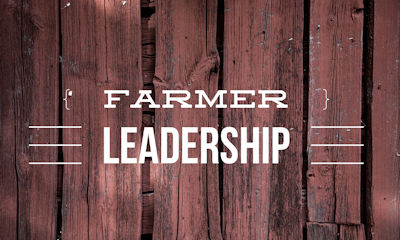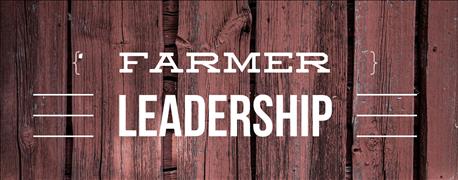
In Illinois, commodity organizations are grassroots efforts. Farmers become members, elect their fellow farmers to serve on boards, hire staff, and the whole operation is run by a president or chairman. For as simple as that sounds, the process and effort are considerably more complicated. Prairie Farmer caught up with the farmer leaders of four organizations – corn, soy, pork and beef – to talk about what it takes to lead an Illinois commodity organization.

Mike Martz, Maple Park
President, Illinois Beef Association
Serving second one-year term
What’s a day in the life like as the president of an Illinois commodity organization?

Farmer leaders of four organizations – corn, soy, pork and beef – talk about what it takes to lead an Illinois commodity organization.
It depends on the day; you have to be ready for anything that’s coming down the pike. The exec, Reid Blossom, and I talk every day about issues and programs. As president, I have less power than as a board member. I run the meetings and go with the directions of the membership and board, and carry that message.
What did your path to the presidency look like?
Lynn and I started farming in Wisconsin, so I was on the county cattlemen’s board and district board and was state membership chair for 2 years. Then we moved to Illinois and I was on DeKalb County Cattlemen’s board for 6 years, and had a couple offices there. Then I was on the checkoff side of IBA for 8 years. I was off for 2 years and really missed it. My son came home and the stars aligned. It was the right time I could run for vice president. You get your feet wet as vice president and know how it works.
What did you have to consider at home before you agreed and were elected?
I went to our farm partnership meeting and they gave me their permission. When I’m not there, someone else has to cover what I do. They were very gracious. Lynn was very supportive. You have to have that back home before you can volunteer with a lot of these organizations. I’m gone off the farm about 60 days a year. The car just kind of moves over those potholes on I-39.
What’s the toughest thing you’ve had to do as president?
Trying to get more cattlemen engaged so it’s just not a few. That’s the biggest challenge.
Best decision you’ve made in your role, so far?
Rely on the whole board and staff and work as team. That’s how our farm operates. I truly believe in that. Because then you get people engaged and they buy in, because they’re part of decision making.
Other thing I’m proud of is our youth programs. If we don’t support the youth, we won’t have an industry that will survive.

Bob Frase, Fairbury
President, Illinois Pork Producers Association
Elected February 2016
What’s a day in the life like as the president of an Illinois commodity organization?
Not a whole lot different from when I wasn’t president. I was already juggling balls and then you add another. Jennifer (Tirey, IPPA executive director) is very good about empowering me and keeping me in the loop.
What did your path to the presidency look like?
When I got on the board seven years ago, I didn’t have designs on being president. Then someone said, we need someone on exec and you look like a good fit.
What’s the toughest thing you’ve had to do as president?
Whether to remodel the bathroom? (laughing) No. To date, it’s been the Chicago Tribune expose. We’re still dealing with fallout. I don’t think we’re done. Staying abreast of that has taken more time. The tough part is that I was interviewed as part of that article, and labeled as a pork industry exec. My loafers always have manure on them, so I don’t think that fits. I’ve always been concerned about that; the farm that I’m part owner in did have a spill but it was an accident, not negligence.
What do you hope to accomplish before your term is up?
Right now is I’d like to get a handle on the Chicago Tribune thing. We are trying to keep it under wraps, and trying not to give it as many legs as it could have. I don’t know that we will. I think it may go into the next legislative session.
Best decision you’ve made in your role, so far?
Reaching out to soy, and reaching out to corn. That came from me. I just thought, we need to do this. Their checkoff does a lot of good things for us. They fund a lot of our projects. We have more similarities than differences.
We did a presentation for soy on what we do with their checkoff dollars, as a way to say thank you. We’re doing the same thing with corn. So if I go away with nothing else, I hope that somehow we’ve strengthened our ties with other commodities.
What’s surprised you during your term?
How much I enjoy being president. I knew I’d have to step out of a box; that’s something any commodity president has to do. To be good, you have to step out and do things you’re not comfortable with.

Daryl Cates, Columbia
Chairman, Illinois Soybean Association
Serving second one-year term
What’s a day in the life like as the head of an Illinois commodity organization?
For this past year, I was gone 110 days, attending different functions and representing the soybean association. Every day, I’ve got 20-50 emails to go through. It can be time consuming. Usually when we’re planting and harvest, things slow down.
What did your path to the chairmanship look like?
I was on the soybean board 30 years ago and came back on three years ago. I was on the Illinois Soybean Operating Board for 6 years, and on the first USB board 25 years ago. Back then, we had $1.5 million to work with at the association, where now we have $13-14 million to work with.
What did you have to consider at home before you agreed and were elected?
Luckily, I have a real good hired hand. If not for him, there’s no way I could’ve been chairman. To be gone a third of the year from the farm operation? He’s kept things going.
What’s the toughest thing you’ve had to do as president?
Getting up in front of people and having to give a speech in front of people. I still get nervous!
What do you hope to accomplish before your term is up?
My biggest goal is to have better communications and working relations with other commodity groups. We’re trying to work something out to get other groups on board and have a state commodity classic – a smaller version of the national conference. Craig (Ratajczk) and I have been talking. We’ll try to work with Illinois Farm Bureau, too. We’re looking at February/March time frame.
Best decision you’ve made in your role, so far?
In September, we signed an agreement with the Taiwanese to buy soybeans from Illinois. We went to a farm up near Chicago, Gov. Rauner showed up and they signed an agreement to buy Illinois soybeans.
Any other big accomplishments?
In June, our board decided to open an office in Chicago. I hope that pans out to be a real shining star for us. The office will be big enough that we could have a board meeting up there, and be a place where other groups could meet. We’re trying to target Millenials, the legislators up there, and the 120 consulates from other countries. We want to increase sales of soybeans eventually.

Jeff Jarboe, Loda
President, Illinois Corn Growers Association
Serving one-year term
What’s a day in the life like as the president of an Illinois commodity organization?
About three times a week, our exec director calls me with different ideas he has. Like this atrazine issue – he bounces things off of me about how he thinks it would be best to fight it.
What did your path to the presidency look like?
I got on the board because I liked what the Corn Growers were doing. Seemed like they had a voice in Washington and very well respected. The dirty secret is that I got on the corn board because I needed a new truck – joined for the discount!
What did leadership training look like?
They had us do mock interviews to be prepared for hostile interviews. I got hit with nitrates and blue baby syndrome. Learned how to talk with senators and representatives, etiquette, and working with different personalities.
What did you have to consider at home before you agreed and were elected?
I farm with my father and brother. I had to consider the health of my parents.
What’s the toughest thing you’ve had to do as president?
There’s one issue that I don’t really believe in; I have a really tough time with it. I try to figure out how I can speak about the issue and not lie. It’s hard for me to talk about something I don’t really believe in.
What do you hope to accomplish before your term is up?
What I’d really like to see is to get E15 usage in Illinois going. We have to get usage up. We have a huge crop coming and huge carryover stocks.
What’s surprised you?
I thought I’d have more control over different issues and I just don’t have it. That would be the big thing. Thought maybe I’d have some influence in Springfield or Washington D.C. You have a little but not as much as I thought. It’s really hard for them to take us real seriously. We’re only 1½ % of the vote.
About the Author(s)
You May Also Like






